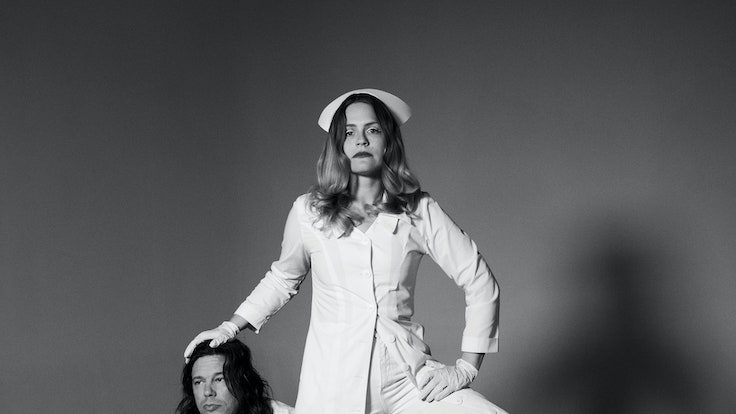
Ty Segall has spent the past 15 years building a vast discography of solo releases, side projects, and genre experiments branching into familiar yet distinct phenotypes of the California auteur’s strummy rock’n’roll. The C.I.A., however, is an outlier within the Segall-verse, expanding his scope rather than filling gaps. Formed in late 2017 by Ty, wife Denée Segall, and the Cairo Gang frontman Emmett Kelly, the trio emerged with a unique amalgam of threadbare electronics, tinny bass, and Denée’s snarling spoken word. While their 2018 debut occasionally drowned in its own marinade of squelching reverb and unbridled feedback, Denée’s charisma and the band’s playful rhythms dredged a solid record out of its still-forming ethos.
Returning five years later with Surgery Channel, the C.I.A. ditch the cavernous echo and zero in on the whirring, abrasive textures of a well-oiled torture device. It’s an upgrade in every sense, hitting harder and delving deeper into the band’s flickering modular synth work while cleverly detouring from their established post-punk blitz. Though the majority of Segall’s releases are identifiable by their twangy barre chords and distorted leads, no member of the C.I.A. wields a six-string guitar. Instead, Ty and Emmett both primarily play bass, splicing fragmentary riffs and gurgling bits of atonal synthesizer atop bare-bones drum machine loops.
There’s little in the way of melody on Surgery Channel. Instead, the band forms a curtain of fuzz that writhes, swells, and undulates like the belly of a serpent. Denée’s writing works in the same vein, communicating through quick rhythmic pulses. She layers disjointed phrases in a brusque fashion that’s opaque yet impressionistic, as if she’s covering a canvas in black paint and drawing attention to each brushstroke. After a brief salvo of hollow snares on “Better,” she conjures a series of images like an overstimulated brain scrambling to process its surroundings. “A flush within/A red upon the skin,” she mutters before offering herself empty consolation each time she reaches the chorus: “It gets better, it gets better, it gets better.” The band’s wriggling low end, which resembles the sound of a groan tube, adds a sense of urgency.
Denée’s range as both a writer and performer has expanded over the past decade, evolving from a garage-rock yawp to a more sinister, assured presence. On “Inhale Exhale,” she barks like a drill sergeant, while on “The Wait,” she bounces between a whispered verse and growled chorus that sounds downright inhuman against a short-circuiting bassline. Her ambitions in turn push Ty and Emmett out of their own comfort zones, especially on Surgery Channel’s second half, where the band gets creative with its drum programming and palette.
